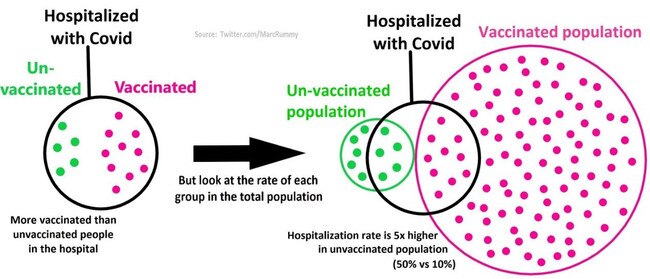Covid-19 anti-vax hysteria reflects poor maths literacy and a lack of critical thinking, educators say
Have you fallen victim to the “base rate fallacy”? Or understand exponential growth? Covid comments on social media expose many people’s failure to grasp basic maths.
SA News
Don't miss out on the headlines from SA News. Followed categories will be added to My News.
A failure to grasp basic maths and critical thinking concepts is fuelling anti-vax hysteria, experts say, prompting calls for better teaching in schools and a public education campaign for adults.
Experts say too many people are susceptible to the fallacy that we are in a “pandemic of the vaccinated” because more vaccinated people are in hospital than unvaccinated ones.
It’s known as the “base rate fallacy” because the community is overwhelmingly vaccinated – nearly 90 per cent in SA – so the hospitalisation rate is in fact many times higher among the unvaccinated population.
A viral Twitter post sums up the fallacy with the analogy: “More people die in car accidents wearing a seat belt than not wearing one, too. But they cut your chance of dying in a crash by about half.”

Adelaide University applied mathematics expert Associate Professor Lewis Mitchell said the pandemic presented a prime opportunity to raise the level of mathematical literacy.
“We’ve never heard people on the news and in everyday society talking so much about exponential growth, probability and mathematical modelling,” he said.
“So just the exposure to these sorts of ideas is actually a positive thing. And hopefully it persists.”
He said he would like to see a public education campaign to foster a deeper understanding of these concepts and also an effort to embed “real, tangible experiences” like the pandemic into the school curriculum.
SACE Board chief Professor Martin Westwell said “democratic discourse” in Australia would improve “if citizens were able to think mathematically in different ways”.
Prof Westwell said too often students were taught how to successfully produce answers to maths problems without really understanding them.
He said the curriculum focused on “students being able to go through mathematical processes when they’re given the information that they need, and only the information that they need”.
“So they know how to answer questions, but what our students are not very good at is knowing how to ask questions,” Prof Westwell said.

Associate Prof Mitchell said combating misinformation spreading through social networks was also important through better teaching of critical thinking.
“Conspiracy theories and ... three-word slogans work because they are simple stories that probably confirm a prior belief that you have and on the surface seem plausible,” he said.
“And you don’t need to think too hard. You can accept something without interrogating it too hard.”
Dealing with facts and evidence, on the other hand, required the ability to “think for a bit longer about the numbers and proportions”.
“It’s easy not to do that extra step of thinking or interrogating something, particularly when it involves numbers and fractions and proportions,” he said.




